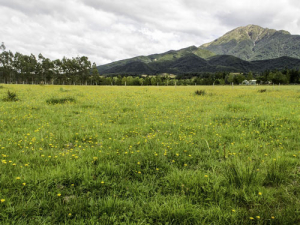NZ kiwifruit sector on alert for mysterious Italian disease
New Zealand's kiwifruit industry is on alert following reports of a mystery disease that is sweeping through Italian orchards.
 Pests are a symptom of an unsustainable farming method, says a visiting expert in ‘regenerative’ agriculture.
Pests are a symptom of an unsustainable farming method, says a visiting expert in ‘regenerative’ agriculture.
Farmers should stop treating agricultural pests as a problem, and instead realise they are a symptom of an unsustainable farming method, says a visiting expert in ‘regenerative’ agriculture.
Dr Jonathan Lundgren, founder of Ecdysis Foundation and Blue Dasher Farm, visited New Zealand for an international workshop on conservation biological control of invertebrate pests, hosted by the Bio-Protection Research Centre at Lincoln University.
He told workshop participants that healthy ecosystems do not have the pest problems that are present in ‘monoculture’ agriculture.
“If you have a pest problem in your field, that’s your field telling you that something is out of whack. If all you are doing is reacting to a pest problem, then you are never going to get ahead; you’ve got to solve the underlying problem, not just the symptoms.”
The underlying problem is lack of biodiversity, Lundgren said. “The way we approach our food production is much too simplified.”
Instead, he said, regenerative agriculture solves pest problems and is more profitable.
Regenerative agriculture goes beyond sustainable agriculture by trying to regenerate degraded land and ecosystems rather than simply sustaining what is left. Farmers who follow regenerative methods use few if any pesticides, don’t till the land, practise crop and stock rotation that mimic natural processes, and encourage biodiversity.
Lundgren said one study found more diverse and more populous insect communities in cow dung from regenerative farms, including more predators of pest species (mostly flies).
The Meat Industry Association of New Zealand (MIA) today announced that Chief Executive Officer Sirma Karapeeva has resigned from the role.
The winners of the 2026 Hawke’s Bay/Wairarapa Dairy Industry Awards were announced at the annual awards dinner held at Copthorne Solway Park in Masterton on Thursday evening.
Environment Southland is welcoming this week’s decision by the Environmental Protection Authority (EPA) to approve the release of Blaptea elguetai, a leaf‑feeding beetle that will help control the highly invasive Chilean flame creeper.
This March, the potato industry is proudly celebrating International Women’s Day on 8 March alongside the International Year of the Woman Farmer, recognising the vital role women play across every part of the sector — from paddocks and packhouses to research, leadership, and innovation.
Fruit trader Seeka posted a record profit and returns to shareholders in 2025.
Recent weather events in the Bay of Plenty, Gisborne/Tairawhiti, and Canterbury have been declared a medium-scale adverse event.
OPINION: Staying with politics, with less than nine months to go before the general elections, there’s confusion in the Labour…
OPINION: Winston Peters' tirade against the free trade deal stitched with India may not be all political posturing by the…